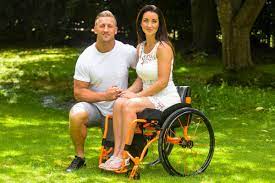
Discovering that your wife is paralyzed is a life-altering moment that can be overwhelming and challenging to navaigate. Paralysis, whether partial or complete, can dramatically impact every aspect of daily life, from physical mobility to emotional well-being. In this blog post, we will explore the journey of coping and thriving when your wife is paralyzed, discussing the emotional impact, practical considerations, and strategies for supporting your wife and yourself through this difficult time.
Understanding Paralysis:
Paralysis is a loss of muscle function in part or all of the body, typically caused by injury or illness affecting the spinal cord or brain. It can result in partial or complete loss of sensation and movement, leading to profound changes in mobility and independence.
Paralysis can occur suddenly due to traumatic injuries such as spinal cord injuries or strokes, or develop gradually as a result of progressive conditions such as multiple sclerosis or ALS (amyotrophic lateral sclerosis). Regardless of the cause, paralysis presents significant challenges for both the individual affected and their loved ones.
Emotional Impact:
Discovering that your wife is paralyzed can evoke a wide range of emotions, including shock, grief, anger, and sadness. As a spouse, you may experience feelings of helplessness, uncertainty, and fear about the future. It's important to acknowledge and validate these emotions while also seeking support and guidance in coping with the challenges ahead.
For your wife, adjusting to life with paralysis can be an emotionally and psychologically taxing experience. She may grapple with feelings of loss, frustration, and identity shift as she navigates the physical and emotional realities of her condition. Encouraging open communication and providing unwavering support and reassurance can help her cope with the emotional impact of paralysis.
Practical Considerations:
Practical considerations play a crucial role in navigating life when your wife is paralyzed. From adapting the home environment to accessing medical care and support services, there are numerous factors to consider in ensuring her safety, comfort, and well-being.
Consider making modifications to the home environment to accommodate her mobility needs, such as installing ramps, grab bars, and wheelchair-accessible features. Explore resources and support services available in your community, such as home healthcare, physical therapy, and support groups for individuals with paralysis and their families.
Supporting Your Wife:
As her spouse and primary caregiver, your role in supporting your wife through her journey with paralysis is invaluable. Be patient, compassionate, and empathetic as she navigates the physical and emotional challenges of her condition. Encourage her independence and autonomy while also providing assistance and support as needed.
Listen actively to her concerns, fears, and needs, and validate her experiences without judgment or criticism. Advocate for her rights and access to necessary medical care and support services, and empower her to make decisions about her health and well-being.
Taking Care of Yourself:
Caring for a spouse with paralysis can be physically, emotionally, and mentally demanding. It's essential to prioritize your own self-care and well-being to ensure that you can effectively support your wife and maintain your own health and resilience.
Make time for activities that bring you joy, relaxation, and rejuvenation, such as exercise, hobbies, and spending time with supportive friends and family members. Seek professional counseling or therapy if you find yourself struggling with overwhelming emotions or stress related to your wife's paralysis.
Final Words:
Discovering that your wife is paralyzed is a life-changing moment that presents numerous challenges and adjustments for both partners. However, it's also an opportunity to cultivate resilience, compassion, and unwavering support as you navigate this journey together.
💬 Your Voice Matters:
If this article touched you or helped you in any way, kindly take a moment to leave a comment. Your words might be the encouragement someone else truly needs today.

